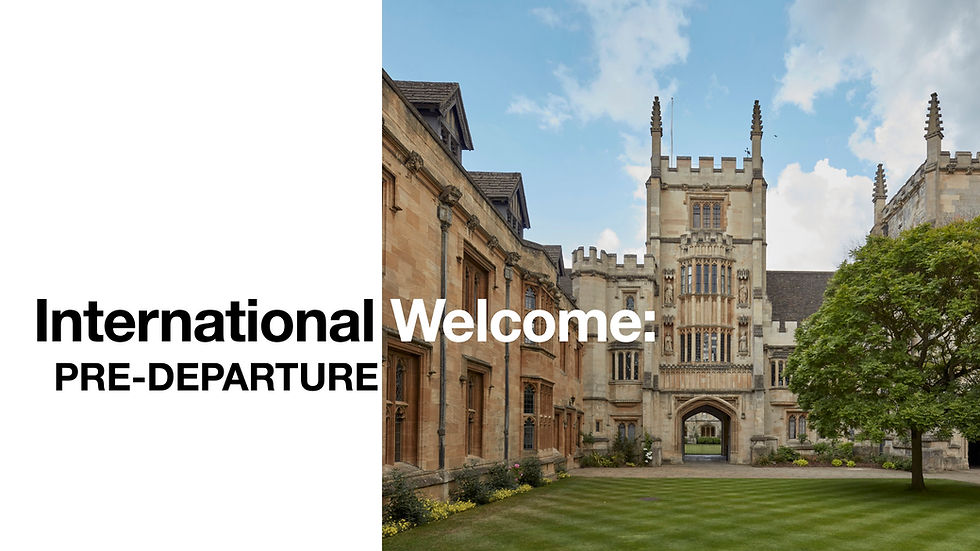Easter in the Pandemic: The Stone is Rolled Away
- Elena Vermeer

- Apr 29, 2021
- 4 min read
Updated: Aug 30, 2025

April 2020 was a surreal time. I was a secondary school student in Hong Kong, frantically preparing for my leaving exams (the HKDSEs). I recall my apprehension and frustration as I was stuck at home, cramming reams of notes, and unsure whether my exams would go ahead, be postponed again (they had already been once), or be cancelled. Amidst this confusion fell Easter Sunday: and everything that seemed to define Easter had been stripped away. No triumphant church service, no chorus of voices singing glorious hymns accompanied by the organ, no fellowship lunches to follow. In fact, I hadn’t been to any in-person church services since January, and by April, one live-stream seemed much like the other. Aside from the decorated Powerpoint Slides of ‘He is Risen’ and the Bible readings reminding me of the familiar story, Easter 2020 went completely over my head. I still believed that Jesus had risen from the grave having defeated sin -- but the glory and triumph of His victory felt overshadowed by the gloom of Covid-19.
Flash-forward to April 2021. I felt an ironic deja-vu as I studied my university course remotely at home. Covid had once again trapped me in apprehension and frustration as I was unsure whether I’d be able to return to Oxford after the Easter vacation, and church services were returned to an online format following a third wave of Covid cases in Hong Kong. Once again, Easter fell amidst confusion.
As we neared Easter Sunday, Covid cases in Hong Kong were dropping and restrictions were being gradually eased. We prayed that restrictions on church services would be next to be lifted, although we doubted whether this was realistic given that the government was already wary of a rebound over Easter. Yet just a few days before Good Friday, it was announced that services could resume. I returned to an in-person service for the first time in five months for Easter Sunday, and felt an overwhelming joy to be in the presence of God’s people again. Singing and praying together as a congregation, hearing the sermon live, chatting before and after the service -- experiencing all these elements I’d missed was incredibly powerful. In the sermon, the pastor compared Christ rolling away the stone of the grave to how the church was opened up once more, stressing how no restrictions can stop His power from moving in this world.
This was a timely reminder. Jesus conquered sin itself, defeated death when He rose again, and offered the grace of His salvation to the entire world. When the veil tore, He opened up His holiness to us all so that we may each have a personal relationship with Him, without the need of any human intercessors. The power of this message, the seismic force of the resurrection, the abundance of His love and grace -- that’s what Easter is about. The spiritual, cosmic dimension of the Easter story extends far beyond the boundaries of our world; it cannot ever be stopped by mere human restrictions. This is not to say that in-person church services are not important -- they are, I believe, a core part of living out our faith -- but we can also rest in the blessed assurance that even when we are kept from meeting in person, no government mandates can stop God’s glory and power from working.
That assurance is also valuable as we consider international fellowship ‘at’ Oxford. I say ‘at’, because, like myself, many international students may not be physically in Oxford at the moment. Studying remotely has been challenging for me, especially as I sometimes feel entirely cut off from the student community. But Christ has rolled the stone away. His power transcends national borders, geographical boundaries, and time zones, and His Spirit continues to breathe upon our ministry even when we are physically apart. As we look ahead to a term of online events, we can remember even in our Zoom-fatigue that God’s power penetrates every computer screen.
From the very beginnings of the church in Acts, Christian ministry has been geographically dispersed, and has faced far greater restrictions than those on in-person events during Covid. Yet the apostles continued to build the early church even when physically separated, especially through letters: by contrast, the technology we possess for keeping in touch is an immense blessing. Despite the difficulties that Covid continues to pose on our ministry and fellowship, we can be grateful for how God’s power continues -- with far greater force than Covid -- to reach every corner of the world.
I will conclude with Paul’s words in Ephesians, which he wrote when he was imprisoned in Rome, miles away from Ephesus. He reminds us of the unity that we share in faith even when physically apart, because God’s power is eternally omnipotent:
There is one body and one Spirit—just as you were called to the one hope that belongs to your call— one Lord, one faith, one baptism, one God and Father of all, who is over all and through all and in all.



Comments